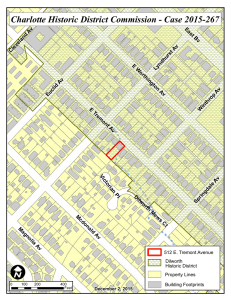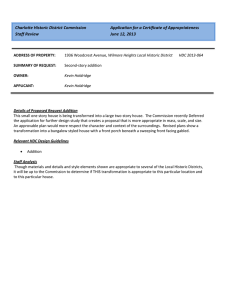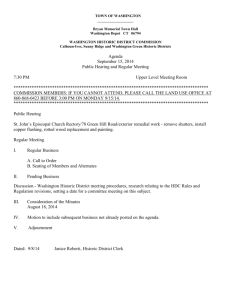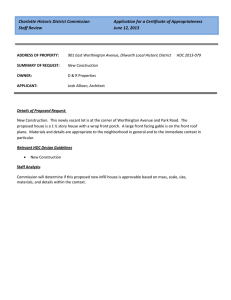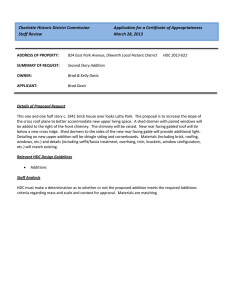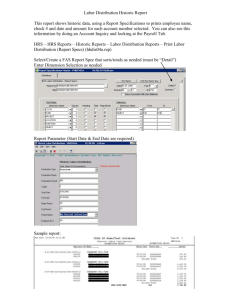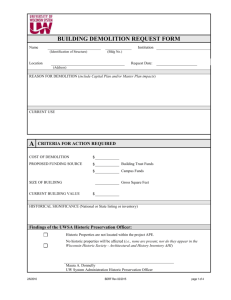Charlotte Historic District Commission Application for a Certificate of Appropriateness Staff Review
advertisement
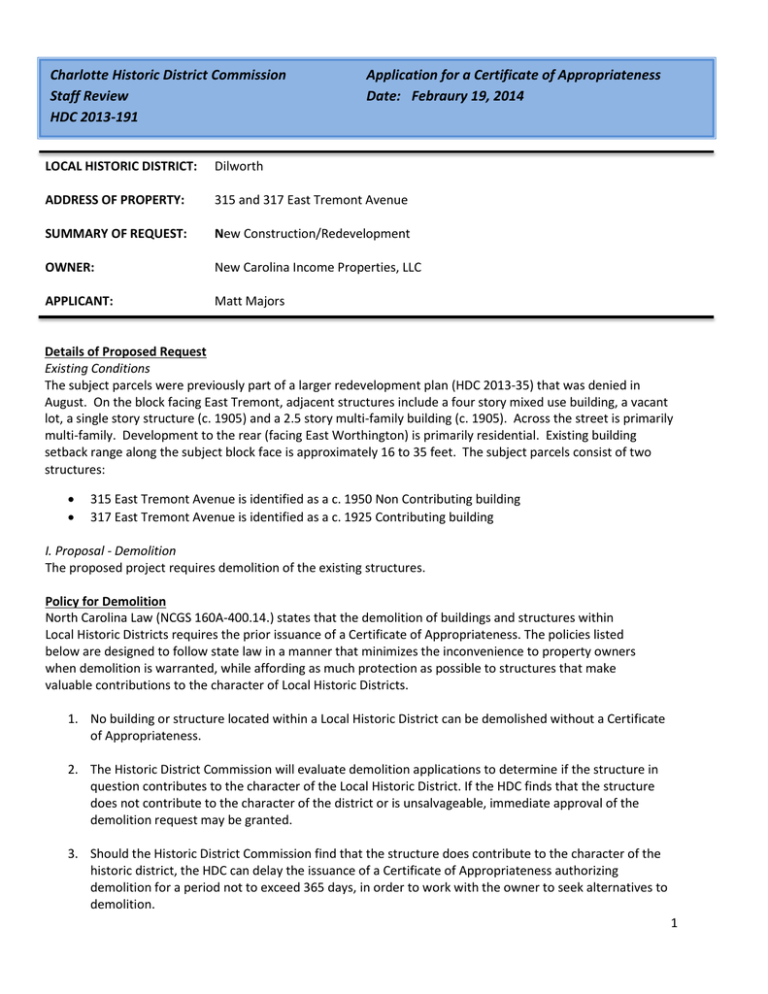
Charlotte Historic District Commission Staff Review HDC 2013-191 Application for a Certificate of Appropriateness Date: Febraury 19, 2014 LOCAL HISTORIC DISTRICT: Dilworth ADDRESS OF PROPERTY: 315 and 317 East Tremont Avenue SUMMARY OF REQUEST: New Construction/Redevelopment OWNER: New Carolina Income Properties, LLC APPLICANT: Matt Majors Details of Proposed Request Existing Conditions The subject parcels were previously part of a larger redevelopment plan (HDC 2013-35) that was denied in August. On the block facing East Tremont, adjacent structures include a four story mixed use building, a vacant lot, a single story structure (c. 1905) and a 2.5 story multi-family building (c. 1905). Across the street is primarily multi-family. Development to the rear (facing East Worthington) is primarily residential. Existing building setback range along the subject block face is approximately 16 to 35 feet. The subject parcels consist of two structures: 315 East Tremont Avenue is identified as a c. 1950 Non Contributing building 317 East Tremont Avenue is identified as a c. 1925 Contributing building I. Proposal - Demolition The proposed project requires demolition of the existing structures. Policy for Demolition North Carolina Law (NCGS 160A-400.14.) states that the demolition of buildings and structures within Local Historic Districts requires the prior issuance of a Certificate of Appropriateness. The policies listed below are designed to follow state law in a manner that minimizes the inconvenience to property owners when demolition is warranted, while affording as much protection as possible to structures that make valuable contributions to the character of Local Historic Districts. 1. No building or structure located within a Local Historic District can be demolished without a Certificate of Appropriateness. 2. The Historic District Commission will evaluate demolition applications to determine if the structure in question contributes to the character of the Local Historic District. If the HDC finds that the structure does not contribute to the character of the district or is unsalvageable, immediate approval of the demolition request may be granted. 3. Should the Historic District Commission find that the structure does contribute to the character of the historic district, the HDC can delay the issuance of a Certificate of Appropriateness authorizing demolition for a period not to exceed 365 days, in order to work with the owner to seek alternatives to demolition. 1 4. When an application for demolition receives a 365-day delay, any consideration of applications for proposed new construction on the same site will be deferred for 90 days. 5. When an application for demolition receives a 365-day delay, the Historic District Commission Staff will seek an alternative to demolition and will contact, within one month of the delay vote, the property owner who has applied for demolition, Historic Charlotte, Inc., and Preservation North Carolina to inform them of the threatened status of the building. 6. A permanent injunction against demolition can be invoked only in cases where a building or structure is certified by the State Historic Preservation Officer as being of statewide significance. 7. Applications for the demolition of dilapidated accessory structures may be eligible for administrative approval. All other demolition applications will be reviewed by the full Commission. 8. The maximum delay period for the issuance of a Certificate of Appropriateness authorizing demolition shall be reduced by the HDC where the Commission finds that the owner would suffer extreme hardship or be permanently deprived of all beneficial use or return from the property by virtue of the delay. Any project that the Historic District Commission determines would require significant and substantial exterior demolition may, at the discretion of the Commission, be subject to the HDC policy on Demolition. II. Proposal – New Construction The proposal is a 12 unit, three story multi-family building with below grade parking and a center courtyard. The project requires rezoning based on the revised plan. Exterior materials include brick, wood and fiber cement siding. The porch roof is standing seam metal. Windows are composite wood frame. Units facing East Tremont Avenue have entrances and porches on the pedestrian level. The proposed setback to the thermal wall is consistent with the existing older structures and the setback to the porch is consistent with the mixed use building. The overall height, as shown, is lower than the adjacent mixed-use building and taller than the structures on the right side. Multi-family buildings across the street are comparable in height to the proposed structure but are constructed on a higher elevation. The rezoning also requires the construction of a new sidewalk and planting strip with street trees. Revised Proposal – February The revised proposal includes the right and rear elevations. Policy & Design Guidelines for New Construction New construction in Local Historic Districts has an obligation to blend in with the historic character and scale of the Local Historic District in which it is located. Designs for infill projects and other new construction within designated Local Historic Districts must be designed with the surroundings in mind. The Historic District Commission will not specify a particular architectural style or design for new construction projects. The scale, mass and size of a building are often far more important than the decorative details applied. However, well designed stylistic and decorative elements, as well as building materials and landscaping, can give new construction projects the attributes necessary to blend in with the district, while creating a distinctive character for the building. New construction projects in Local Historic Districts must be appropriate to their surroundings. The Historic District Commission will review the building details for all new construction as part of their evaluation of new construction project proposals. 2 Staff Analysis Staff believes the project meets the applicable guidelines for new construction. However, the Commission should discuss Fenestration based on comments from the previous meeting. 3 Av So u th B v Cl ev e la nd Charlotte Historic District Commission - Case 2013-191 District Location; Dilworth d Eu cl i lid on tA v Eu c Tr em Av E . 0 100 200 Av Ly nd hu r st Av d Eu cl i At he rto n H ei gh ts Ln E W or th in gt on d Av Cl ev e la nd Av E Bl v Av So ut h Bv Ea st E Tr em on Av 315&317 East Tremont 400 Feet Map Printdate; Dec. 2013 Dilworth Local Historic District Property Lines Building Footprints tA v W o Monday, November 18, 2013 12:25 PM Virtual Charlotte, Charlotte GIS http://vc.charmeck.org/ Screen clipping taken: 12/3/2013 11:29 AM Virtual Charlotte, Charlotte GIS http://vc.charmeck.org/ Screen clipping taken: 12/3/2013 11:27 AM Virtual Charlotte, Charlotte GIS http://vc.charmeck.org/ Miscellaneous Page 1 315 East Tremont Ave 317 East Tremont Ave DECEMBER 2013 FEBRUARY 2014
